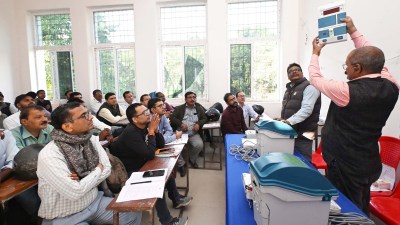The Malcontent
I had this half-remembered image of a nurse in a hospital room,very late at night. She looked beautiful and tired but very committed. But it was just an image.
Mohammed Hanif,the wry interpreter of Pakistans maladies,on channelling his madness,and his new novel
I had this half-remembered image of a nurse in a hospital room,very late at night. She looked beautiful and tired but very committed. But it was just an image. I had to write her to find out who she was, says Pakistani author Mohammed Hanif. Through this image,stolen between dream and reality,he created Alice Bhatti,Replacement Junior Nurse,Grade 4,at the Sacred Heart Hospital for All Ailments and the lead character of his new novel Our Lady of Alice Bhatti. In writing her,Hanif discovered a 27-year-old,grey-eyed all-weather,all-terrain fighter,whose body is a compact war zone where competing warriors have trampled and left their marks. She evolved through his writing and imagining. He spent odd hours with her in odd places. He led her on walks and thought of her on sleepless nights. He had to live with this Catholic choohra,daughter of a sweeper,to discover what she wanted in life. Turns out the same things I want, he says,a job,a bit of dignity,a bit of love. And children. Through Alice and her Karachi-based noir love story,Hanif spins a tale of a woman with scars and a woman fighting back.
The novel tells of the unlikely love between nurse Alice and Teddy Butt,of waxed chest and hard stomach,who works unofficially for G squad (which specialises in encounter killings of sorts). Soothing the doomed slut is the nearest he has come to having a job description. For Hanif,this isnt a love story of opposites,where a good girl falls for a bad boy.
Instead,its a story of two similar people,as both are in love. I do believe them when they are in love, he adds.
This novel comes after the success of A Case of Exploding Mangoes,longlisted for the 2008 Man Booker Prize,based on the crash of a plane,which killed Pakistans dictator General Zia-ul-Haq,several army generals and the US ambassador to Pakistan. Hanif,a journalist by trade,who trained briefly with Pakistan Air force Academy,never strays from the political,be it in his newspaper columns or novels. Alice Bhatti is a story of boy trying to impress girl,girl playing hard to get,boy trying harder,girl succumbing,marriage,happiness,sadness,but the kernel remains political,spelling out injustices and struggles.
Within six months of working in Accidents and Emergencies,Alice realises that most of lifes arguments,it seemed,got settled by doing various things to a womans body. For Hanif,the political inks all of life. I am one of those old-fashioned people, he says,who believe that all writing is essentially political. He is incapable of giving up on the political or politicians. Potentially as a voter I am their (politicians) path to power and bigger Swiss accounts. And as a voter,I expect my garbage to be picked up. We are not likely to give up on each other easily, he says with signature wry humour.
To read this novel is to hear the novelists voice behind it unsmiling,deadpan and cracking an inside joke with an invisible audience. He pulls faces in his writing just as he does in real life,believing that he didnt choose satire,instead satire chose him. In his interviews too,one wonders if he is for real or for a lark. Is he being serious? Can he be serious? Who is he laughing at?
His characters and incidents never breach reality but their above-normal pitch makes them absurd,at times. They dally in and out of the borderless worlds of the recognisable and the satirical. Hanif has also written plays and even the screenplay of the successful The Long Night,said to be Pakistans first digital feature,about an ambitious software engineer caught in a mysterious womans web. Hanifs voice is that of the fishermen and artisans of Italy,who would exchange tall tales,spiked with political satire. The first theatre this novelist and playwright saw was by Dario Fo,1997 Nobel Prize winner,best known for his unforgiving political satire. He grew up watching Fos plays in Karachi,translated into Urdu and adapted by playwright Imran Aslam. He hasnt read the Italian maestro but believes that every civilised city should have at least one Dario Fo play running in a local language at any given point in time.
In 2008,Hanif returned to Pakistan after 12 years in Britain. He started Alice Bhatti in London but wrote most of it in Karachi. Though Hanif was born in Okara,Pakistan,he calls himself a Karachiite,even while describing Karachi as a really f****d-up place that gave me work,love and sea breeze. He applies no gloss over blemishes,be it on the city or his characters. He writes of VIPs abusing nurses,of riots of revenge,of the city burning,of normalcy limping back to the city. As if normalcy had gone for a walk and sprained an ankle. For this malcontent who admits that he despises anything with a positive prefix,writing provides an escape when all else crowds in and risks overwhelming him. He does get overwhelmed easily,he admits. He wrote Exploding Mangoes while in London,and says that he might have written it to get a grip on his life. Writing allows him to get away from life and dream up silly stories, he says,it allows him to escape into fantasies of killing long-dead dictators and finally,lets him,channel his madness through various characters.
Alice Bhatti builds toward inevitable doom,like an Othello made for the subcontinent. Do the dark themes of his novel reflect contemporary Pakistan? He replies,No it reflects the state of my mind.
Even while the book doesnt draw from obvious political and historic characters,like Exploding Mangoes,the possibly-incendiary is not missing. But Hanif appears unfazed by its reception back home,claiming that in Pakistan,one worries more about bullets than bad book reviews. Exploding Mangoes received much applause outside of Pakistan. Within the country,even though Zia is not universally popular,no mainstream Pakistani publisher published it. For Hanif this is an example of the publishers short-sightedness,who believed that the book would be scandalous. The reading public is more evolved than the publishing industry, he says.
The rest of the world might be cooing about Pakistans literary talents,but Hanif doesnt think of the literary scene in Pakistan. He says instead,Some people read and some write and that goes on despite everything. He does regret,however,that the readership for Sindhi and Punjabi novels remain exclusive,with readers only reading their own language.
Of late,Urdu pulp has immersed him. He recently finished Mein Kissi Ki Beti Nahin (I Am No Ones Daughter),an alleged memoir of a high-society prostitute,brimming with morality tales and messages of jihad. Written in the 70s,it swarms with sex and sermons. He has also been reading bestselling Urdu writer Umaira Ahmed whose novels often get serialised on prime-time TV. Hanif has been trying to interview her but has been told she doesnt do press. Wise woman. Why waste time on these interviews when you could be writing your next bestseller? he says,wisely.



- 01
- 02
- 03
- 04
- 05




























